Business & Corporation Law: Contract Law Scenarios and ILAC Analysis
VerifiedAdded on 2023/04/11
|8
|1192
|316
Report
AI Summary
This report provides a detailed analysis of several contract law scenarios within a business context, utilizing the ILAC (Issue, Law, Application, Conclusion) method. It examines issues such as mutual mistake, offer and acceptance, the postal rule, parol evidence rule, and the distinction between offers and invitations to treat. The report assesses the legal positions of various parties involved in hypothetical situations related to the sale of goods, specifically cars and trucks, determining whether valid contracts exist and the potential liabilities of the parties. Key cases like Raffles v Wichelhaus and Adams v Lindsell are applied to analyze the scenarios and reach informed conclusions. The analysis determines whether a contract is void due to mutual mistake, whether acceptance was properly communicated, and if parties are obligated to fulfill agreements.
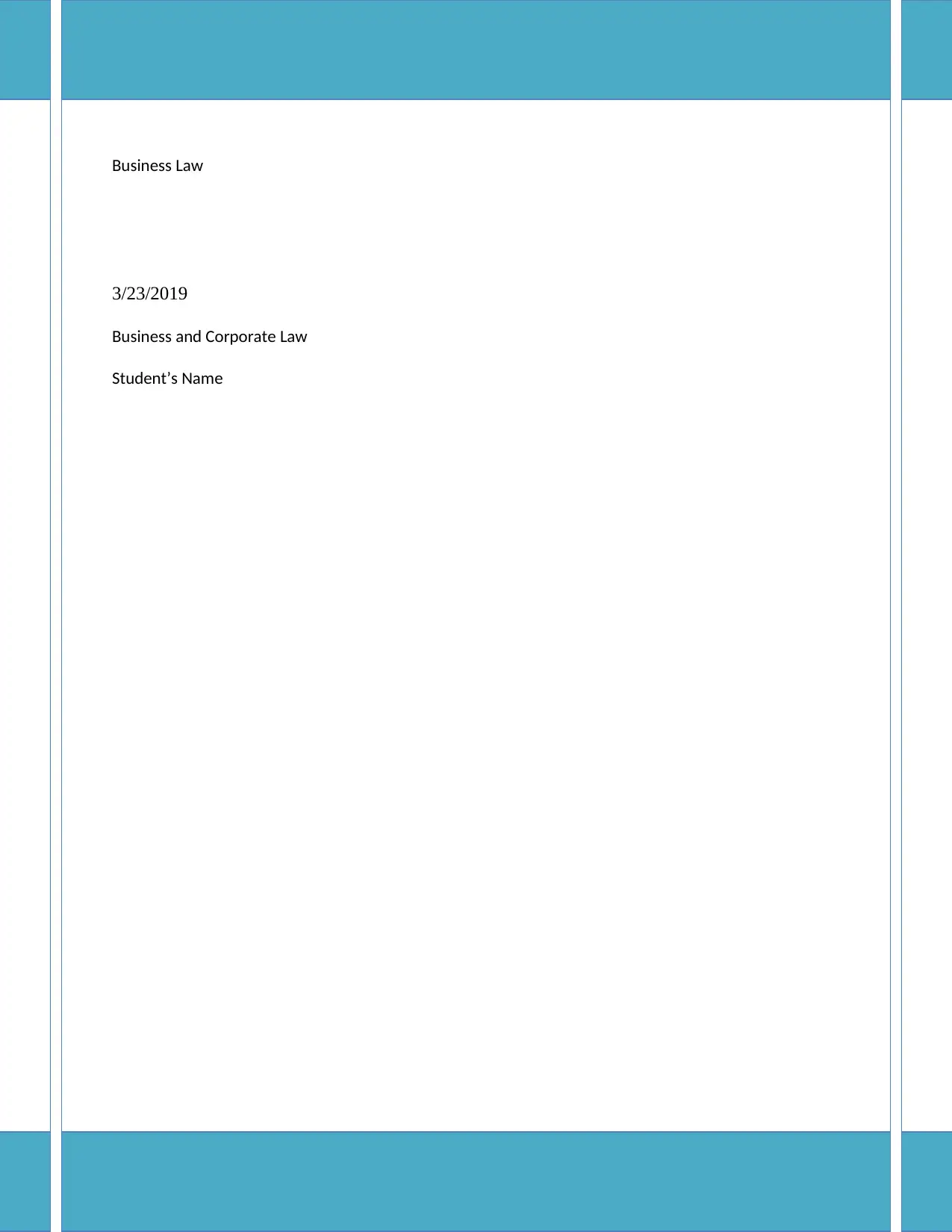
Running Head: BUSINESS AND CORPORATION LAW 0
Business Law
3/23/2019
Business and Corporate Law
Student’s Name
Business Law
3/23/2019
Business and Corporate Law
Student’s Name
Paraphrase This Document
Need a fresh take? Get an instant paraphrase of this document with our AI Paraphraser
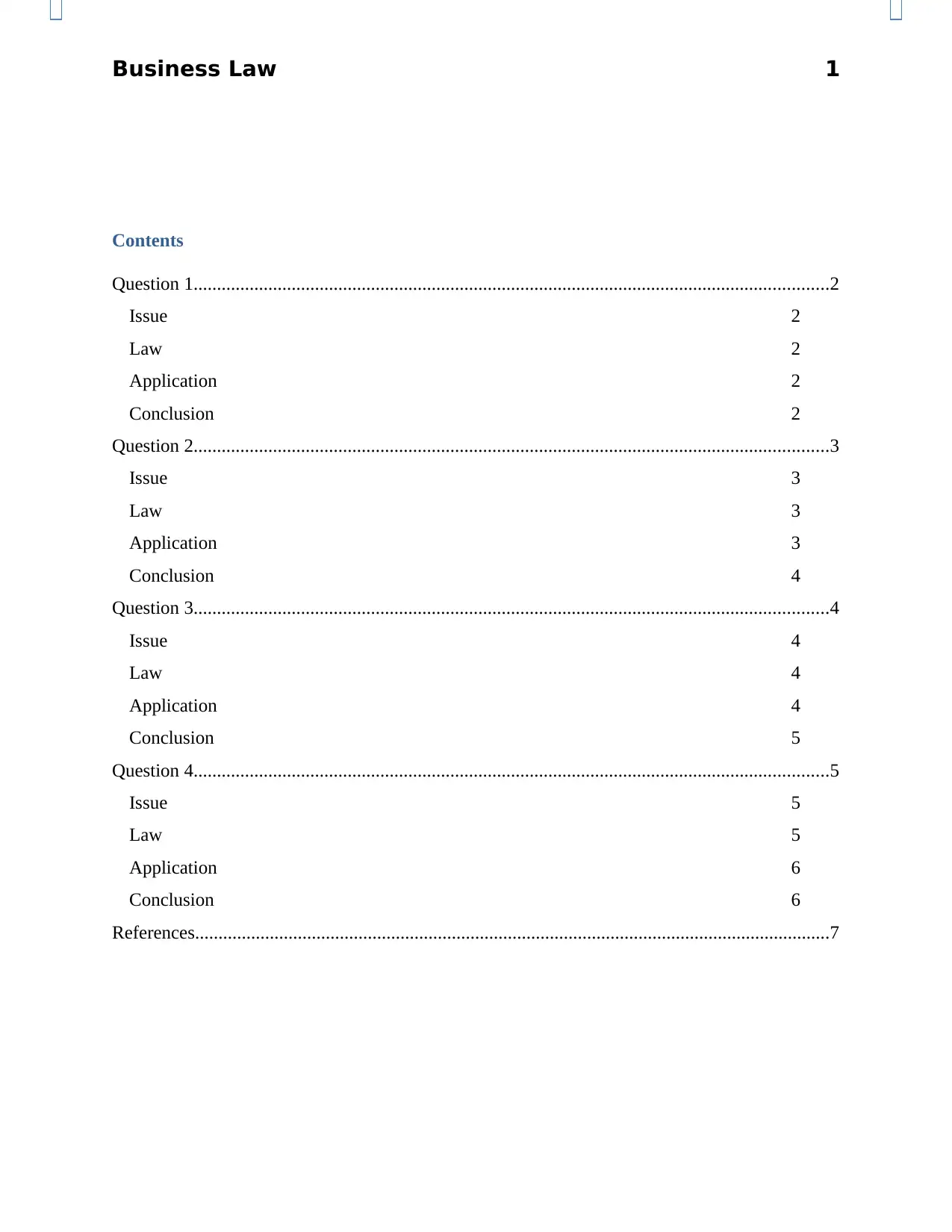
Business Law 1
Contents
Question 1........................................................................................................................................2
Issue 2
Law 2
Application 2
Conclusion 2
Question 2........................................................................................................................................3
Issue 3
Law 3
Application 3
Conclusion 4
Question 3........................................................................................................................................4
Issue 4
Law 4
Application 4
Conclusion 5
Question 4........................................................................................................................................5
Issue 5
Law 5
Application 6
Conclusion 6
References........................................................................................................................................7
Contents
Question 1........................................................................................................................................2
Issue 2
Law 2
Application 2
Conclusion 2
Question 2........................................................................................................................................3
Issue 3
Law 3
Application 3
Conclusion 4
Question 3........................................................................................................................................4
Issue 4
Law 4
Application 4
Conclusion 5
Question 4........................................................................................................................................5
Issue 5
Law 5
Application 6
Conclusion 6
References........................................................................................................................................7
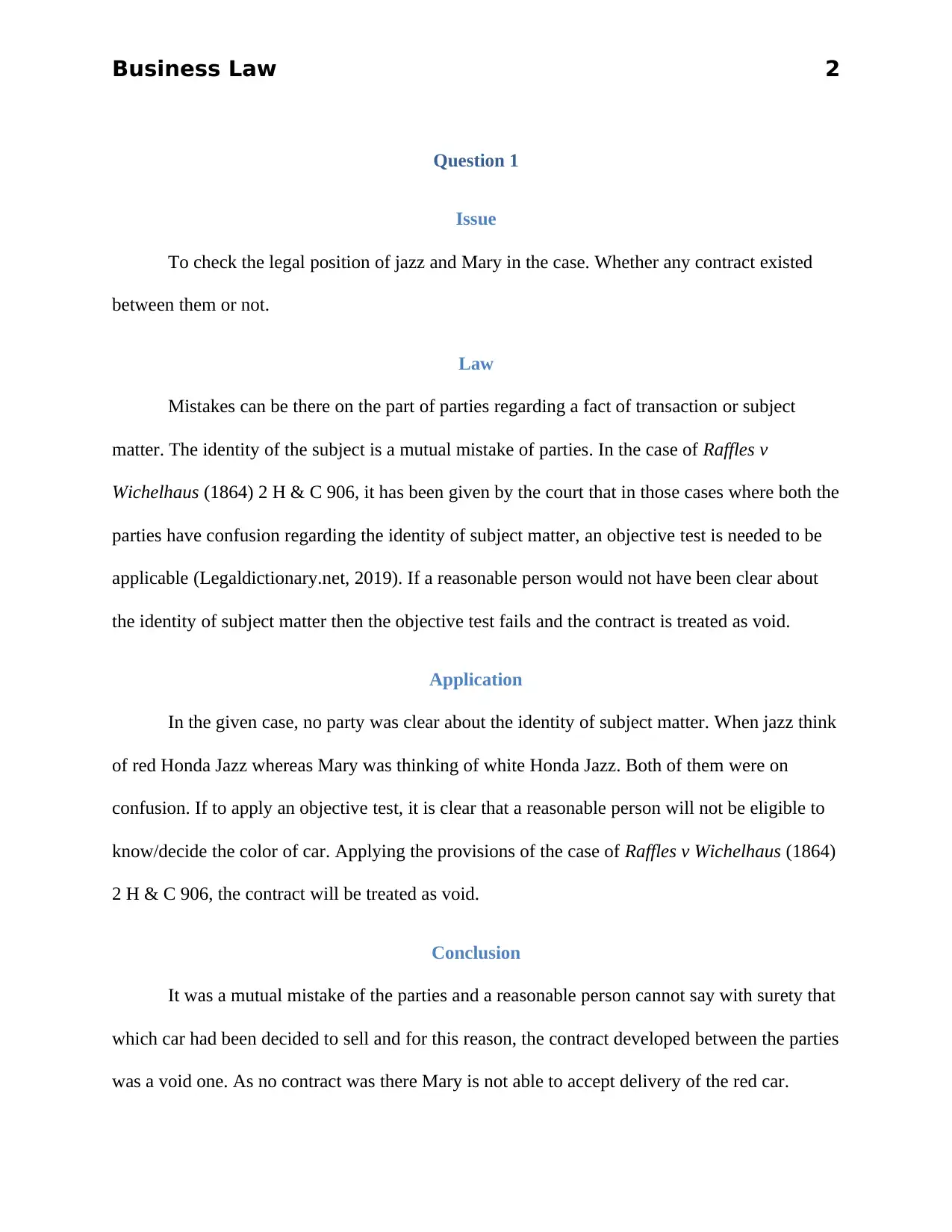
Business Law 2
Question 1
Issue
To check the legal position of jazz and Mary in the case. Whether any contract existed
between them or not.
Law
Mistakes can be there on the part of parties regarding a fact of transaction or subject
matter. The identity of the subject is a mutual mistake of parties. In the case of Raffles v
Wichelhaus (1864) 2 H & C 906, it has been given by the court that in those cases where both the
parties have confusion regarding the identity of subject matter, an objective test is needed to be
applicable (Legaldictionary.net, 2019). If a reasonable person would not have been clear about
the identity of subject matter then the objective test fails and the contract is treated as void.
Application
In the given case, no party was clear about the identity of subject matter. When jazz think
of red Honda Jazz whereas Mary was thinking of white Honda Jazz. Both of them were on
confusion. If to apply an objective test, it is clear that a reasonable person will not be eligible to
know/decide the color of car. Applying the provisions of the case of Raffles v Wichelhaus (1864)
2 H & C 906, the contract will be treated as void.
Conclusion
It was a mutual mistake of the parties and a reasonable person cannot say with surety that
which car had been decided to sell and for this reason, the contract developed between the parties
was a void one. As no contract was there Mary is not able to accept delivery of the red car.
Question 1
Issue
To check the legal position of jazz and Mary in the case. Whether any contract existed
between them or not.
Law
Mistakes can be there on the part of parties regarding a fact of transaction or subject
matter. The identity of the subject is a mutual mistake of parties. In the case of Raffles v
Wichelhaus (1864) 2 H & C 906, it has been given by the court that in those cases where both the
parties have confusion regarding the identity of subject matter, an objective test is needed to be
applicable (Legaldictionary.net, 2019). If a reasonable person would not have been clear about
the identity of subject matter then the objective test fails and the contract is treated as void.
Application
In the given case, no party was clear about the identity of subject matter. When jazz think
of red Honda Jazz whereas Mary was thinking of white Honda Jazz. Both of them were on
confusion. If to apply an objective test, it is clear that a reasonable person will not be eligible to
know/decide the color of car. Applying the provisions of the case of Raffles v Wichelhaus (1864)
2 H & C 906, the contract will be treated as void.
Conclusion
It was a mutual mistake of the parties and a reasonable person cannot say with surety that
which car had been decided to sell and for this reason, the contract developed between the parties
was a void one. As no contract was there Mary is not able to accept delivery of the red car.
⊘ This is a preview!⊘
Do you want full access?
Subscribe today to unlock all pages.

Trusted by 1+ million students worldwide
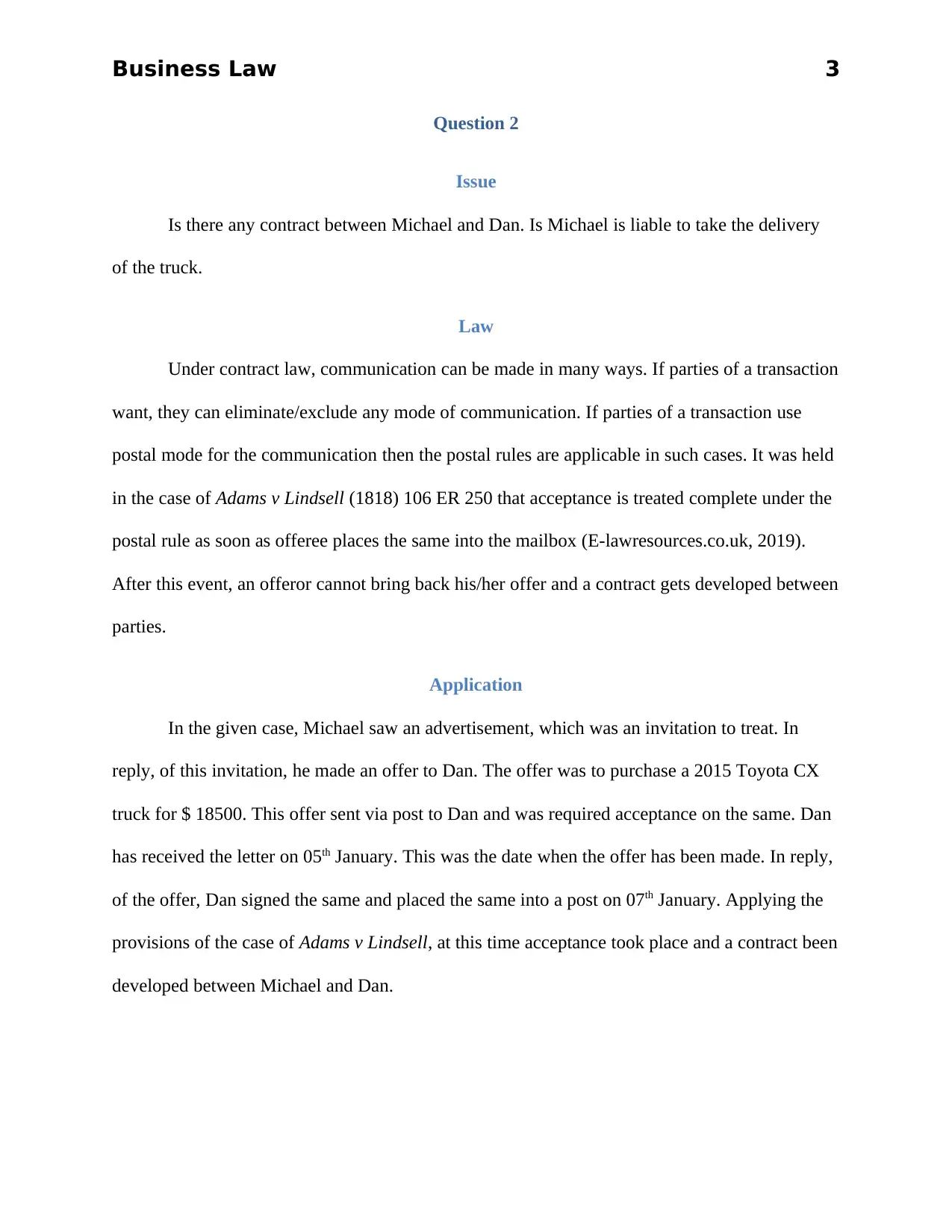
Business Law 3
Question 2
Issue
Is there any contract between Michael and Dan. Is Michael is liable to take the delivery
of the truck.
Law
Under contract law, communication can be made in many ways. If parties of a transaction
want, they can eliminate/exclude any mode of communication. If parties of a transaction use
postal mode for the communication then the postal rules are applicable in such cases. It was held
in the case of Adams v Lindsell (1818) 106 ER 250 that acceptance is treated complete under the
postal rule as soon as offeree places the same into the mailbox (E-lawresources.co.uk, 2019).
After this event, an offeror cannot bring back his/her offer and a contract gets developed between
parties.
Application
In the given case, Michael saw an advertisement, which was an invitation to treat. In
reply, of this invitation, he made an offer to Dan. The offer was to purchase a 2015 Toyota CX
truck for $ 18500. This offer sent via post to Dan and was required acceptance on the same. Dan
has received the letter on 05th January. This was the date when the offer has been made. In reply,
of the offer, Dan signed the same and placed the same into a post on 07th January. Applying the
provisions of the case of Adams v Lindsell, at this time acceptance took place and a contract been
developed between Michael and Dan.
Question 2
Issue
Is there any contract between Michael and Dan. Is Michael is liable to take the delivery
of the truck.
Law
Under contract law, communication can be made in many ways. If parties of a transaction
want, they can eliminate/exclude any mode of communication. If parties of a transaction use
postal mode for the communication then the postal rules are applicable in such cases. It was held
in the case of Adams v Lindsell (1818) 106 ER 250 that acceptance is treated complete under the
postal rule as soon as offeree places the same into the mailbox (E-lawresources.co.uk, 2019).
After this event, an offeror cannot bring back his/her offer and a contract gets developed between
parties.
Application
In the given case, Michael saw an advertisement, which was an invitation to treat. In
reply, of this invitation, he made an offer to Dan. The offer was to purchase a 2015 Toyota CX
truck for $ 18500. This offer sent via post to Dan and was required acceptance on the same. Dan
has received the letter on 05th January. This was the date when the offer has been made. In reply,
of the offer, Dan signed the same and placed the same into a post on 07th January. Applying the
provisions of the case of Adams v Lindsell, at this time acceptance took place and a contract been
developed between Michael and Dan.
Paraphrase This Document
Need a fresh take? Get an instant paraphrase of this document with our AI Paraphraser
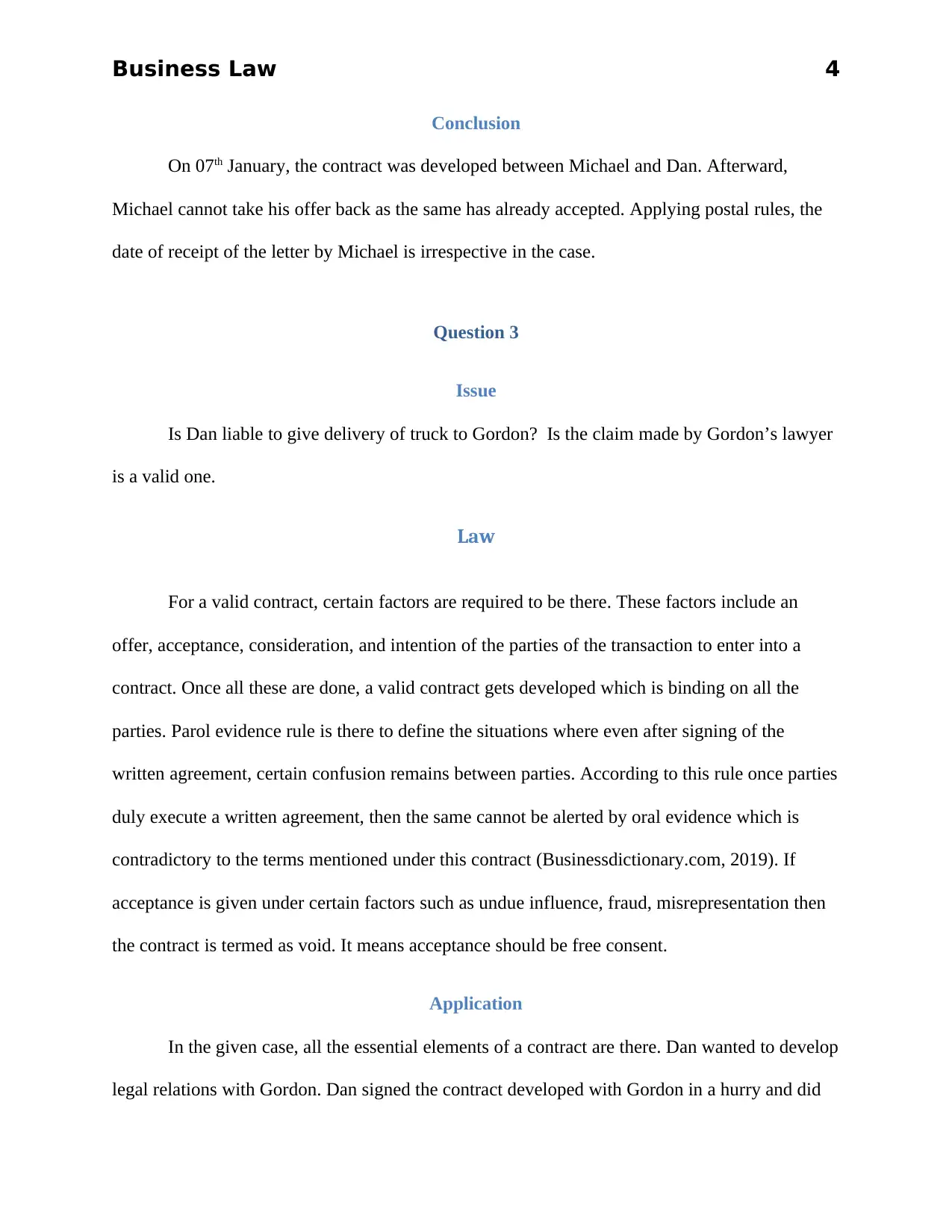
Business Law 4
Conclusion
On 07th January, the contract was developed between Michael and Dan. Afterward,
Michael cannot take his offer back as the same has already accepted. Applying postal rules, the
date of receipt of the letter by Michael is irrespective in the case.
Question 3
Issue
Is Dan liable to give delivery of truck to Gordon? Is the claim made by Gordon’s lawyer
is a valid one.
Law
For a valid contract, certain factors are required to be there. These factors include an
offer, acceptance, consideration, and intention of the parties of the transaction to enter into a
contract. Once all these are done, a valid contract gets developed which is binding on all the
parties. Parol evidence rule is there to define the situations where even after signing of the
written agreement, certain confusion remains between parties. According to this rule once parties
duly execute a written agreement, then the same cannot be alerted by oral evidence which is
contradictory to the terms mentioned under this contract (Businessdictionary.com, 2019). If
acceptance is given under certain factors such as undue influence, fraud, misrepresentation then
the contract is termed as void. It means acceptance should be free consent.
Application
In the given case, all the essential elements of a contract are there. Dan wanted to develop
legal relations with Gordon. Dan signed the contract developed with Gordon in a hurry and did
Conclusion
On 07th January, the contract was developed between Michael and Dan. Afterward,
Michael cannot take his offer back as the same has already accepted. Applying postal rules, the
date of receipt of the letter by Michael is irrespective in the case.
Question 3
Issue
Is Dan liable to give delivery of truck to Gordon? Is the claim made by Gordon’s lawyer
is a valid one.
Law
For a valid contract, certain factors are required to be there. These factors include an
offer, acceptance, consideration, and intention of the parties of the transaction to enter into a
contract. Once all these are done, a valid contract gets developed which is binding on all the
parties. Parol evidence rule is there to define the situations where even after signing of the
written agreement, certain confusion remains between parties. According to this rule once parties
duly execute a written agreement, then the same cannot be alerted by oral evidence which is
contradictory to the terms mentioned under this contract (Businessdictionary.com, 2019). If
acceptance is given under certain factors such as undue influence, fraud, misrepresentation then
the contract is termed as void. It means acceptance should be free consent.
Application
In the given case, all the essential elements of a contract are there. Dan wanted to develop
legal relations with Gordon. Dan signed the contract developed with Gordon in a hurry and did
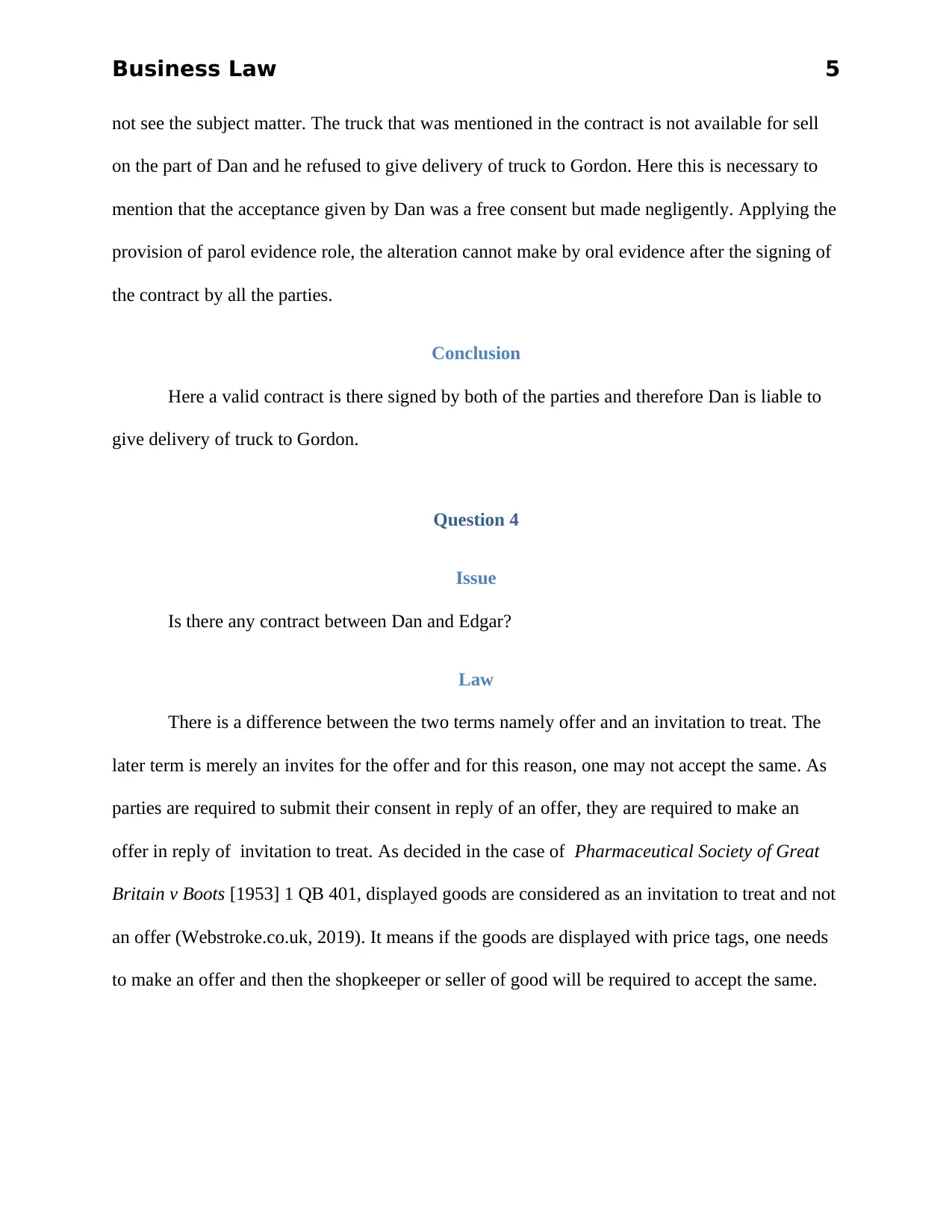
Business Law 5
not see the subject matter. The truck that was mentioned in the contract is not available for sell
on the part of Dan and he refused to give delivery of truck to Gordon. Here this is necessary to
mention that the acceptance given by Dan was a free consent but made negligently. Applying the
provision of parol evidence role, the alteration cannot make by oral evidence after the signing of
the contract by all the parties.
Conclusion
Here a valid contract is there signed by both of the parties and therefore Dan is liable to
give delivery of truck to Gordon.
Question 4
Issue
Is there any contract between Dan and Edgar?
Law
There is a difference between the two terms namely offer and an invitation to treat. The
later term is merely an invites for the offer and for this reason, one may not accept the same. As
parties are required to submit their consent in reply of an offer, they are required to make an
offer in reply of invitation to treat. As decided in the case of Pharmaceutical Society of Great
Britain v Boots [1953] 1 QB 401, displayed goods are considered as an invitation to treat and not
an offer (Webstroke.co.uk, 2019). It means if the goods are displayed with price tags, one needs
to make an offer and then the shopkeeper or seller of good will be required to accept the same.
not see the subject matter. The truck that was mentioned in the contract is not available for sell
on the part of Dan and he refused to give delivery of truck to Gordon. Here this is necessary to
mention that the acceptance given by Dan was a free consent but made negligently. Applying the
provision of parol evidence role, the alteration cannot make by oral evidence after the signing of
the contract by all the parties.
Conclusion
Here a valid contract is there signed by both of the parties and therefore Dan is liable to
give delivery of truck to Gordon.
Question 4
Issue
Is there any contract between Dan and Edgar?
Law
There is a difference between the two terms namely offer and an invitation to treat. The
later term is merely an invites for the offer and for this reason, one may not accept the same. As
parties are required to submit their consent in reply of an offer, they are required to make an
offer in reply of invitation to treat. As decided in the case of Pharmaceutical Society of Great
Britain v Boots [1953] 1 QB 401, displayed goods are considered as an invitation to treat and not
an offer (Webstroke.co.uk, 2019). It means if the goods are displayed with price tags, one needs
to make an offer and then the shopkeeper or seller of good will be required to accept the same.
⊘ This is a preview!⊘
Do you want full access?
Subscribe today to unlock all pages.

Trusted by 1+ million students worldwide
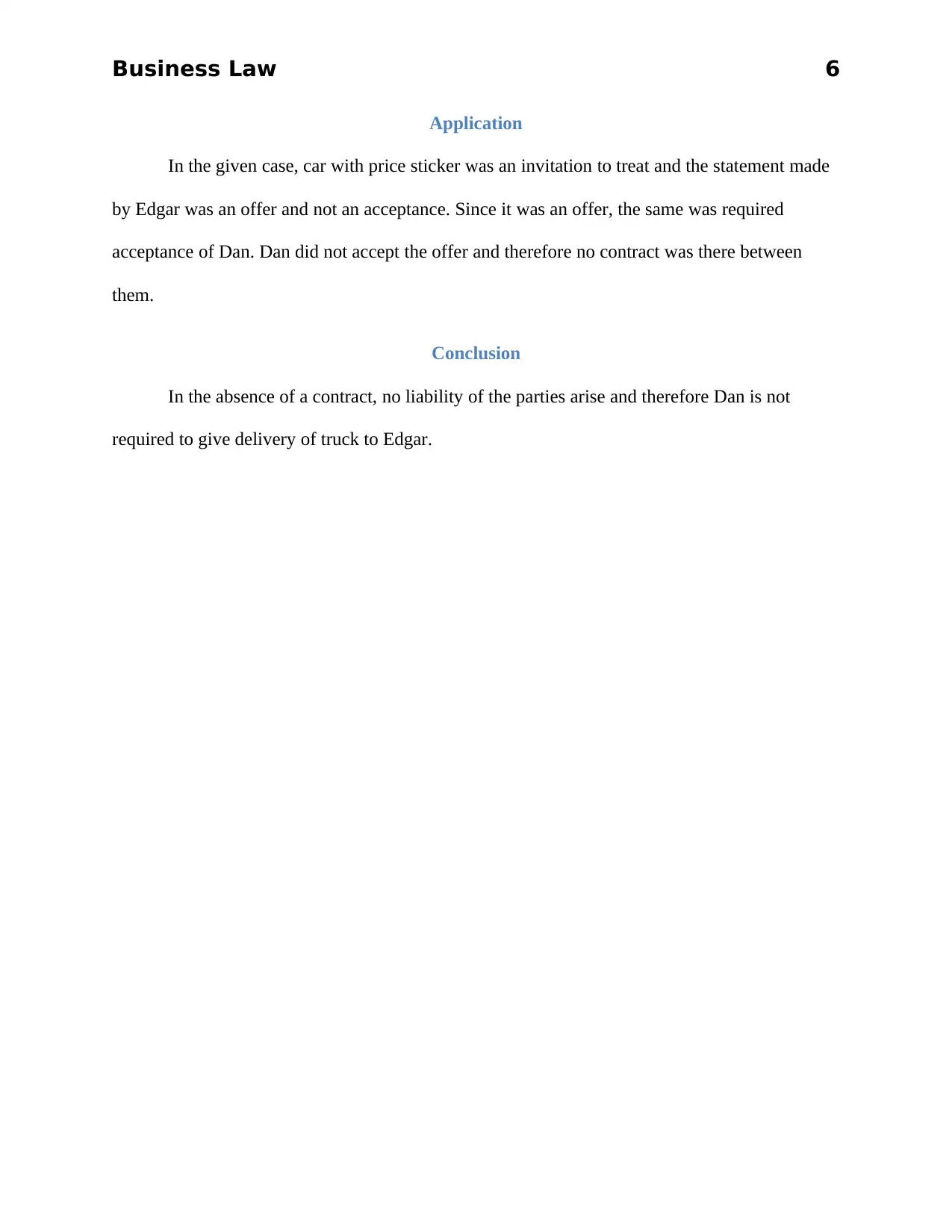
Business Law 6
Application
In the given case, car with price sticker was an invitation to treat and the statement made
by Edgar was an offer and not an acceptance. Since it was an offer, the same was required
acceptance of Dan. Dan did not accept the offer and therefore no contract was there between
them.
Conclusion
In the absence of a contract, no liability of the parties arise and therefore Dan is not
required to give delivery of truck to Edgar.
Application
In the given case, car with price sticker was an invitation to treat and the statement made
by Edgar was an offer and not an acceptance. Since it was an offer, the same was required
acceptance of Dan. Dan did not accept the offer and therefore no contract was there between
them.
Conclusion
In the absence of a contract, no liability of the parties arise and therefore Dan is not
required to give delivery of truck to Edgar.
Paraphrase This Document
Need a fresh take? Get an instant paraphrase of this document with our AI Paraphraser
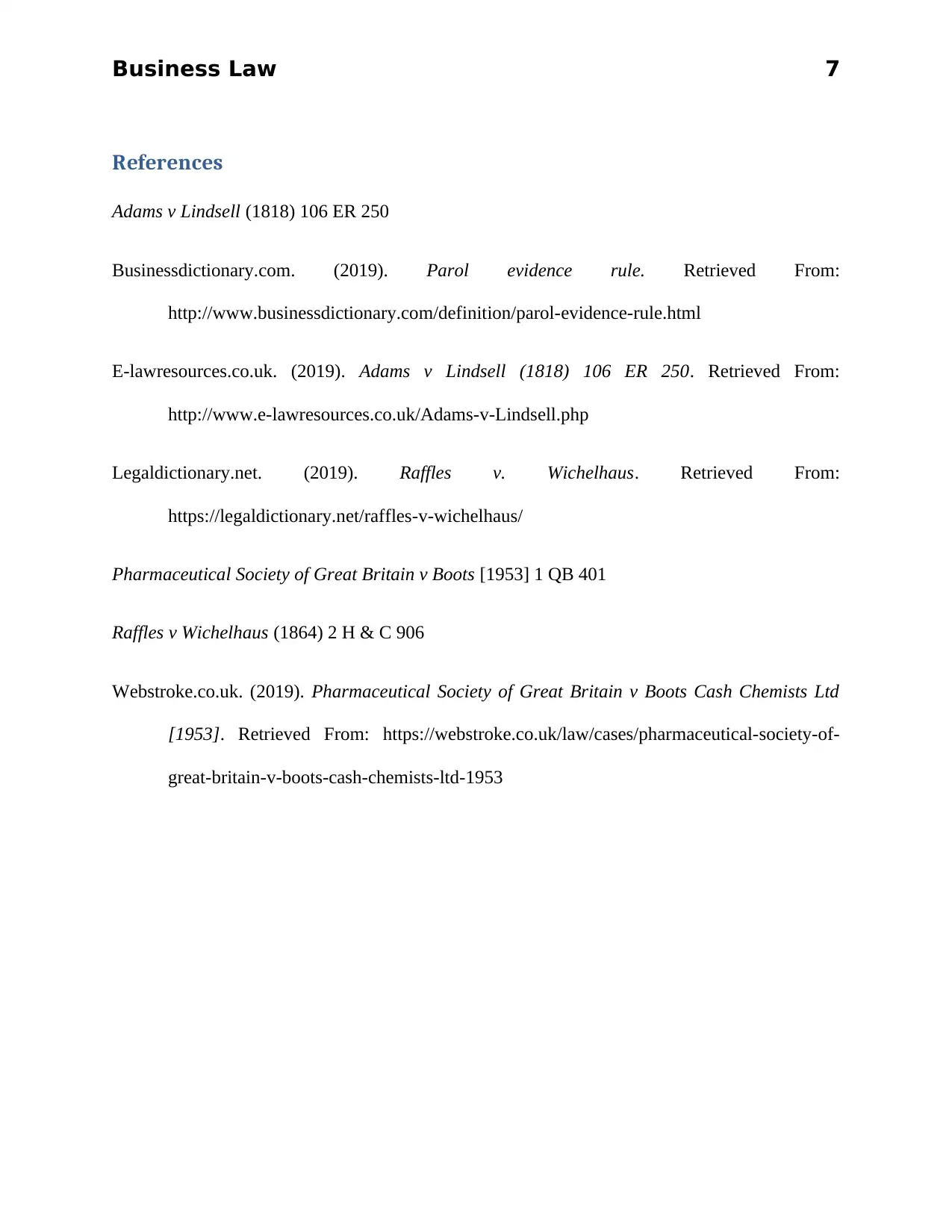
Business Law 7
References
Adams v Lindsell (1818) 106 ER 250
Businessdictionary.com. (2019). Parol evidence rule. Retrieved From:
http://www.businessdictionary.com/definition/parol-evidence-rule.html
E-lawresources.co.uk. (2019). Adams v Lindsell (1818) 106 ER 250. Retrieved From:
http://www.e-lawresources.co.uk/Adams-v-Lindsell.php
Legaldictionary.net. (2019). Raffles v. Wichelhaus. Retrieved From:
https://legaldictionary.net/raffles-v-wichelhaus/
Pharmaceutical Society of Great Britain v Boots [1953] 1 QB 401
Raffles v Wichelhaus (1864) 2 H & C 906
Webstroke.co.uk. (2019). Pharmaceutical Society of Great Britain v Boots Cash Chemists Ltd
[1953]. Retrieved From: https://webstroke.co.uk/law/cases/pharmaceutical-society-of-
great-britain-v-boots-cash-chemists-ltd-1953
References
Adams v Lindsell (1818) 106 ER 250
Businessdictionary.com. (2019). Parol evidence rule. Retrieved From:
http://www.businessdictionary.com/definition/parol-evidence-rule.html
E-lawresources.co.uk. (2019). Adams v Lindsell (1818) 106 ER 250. Retrieved From:
http://www.e-lawresources.co.uk/Adams-v-Lindsell.php
Legaldictionary.net. (2019). Raffles v. Wichelhaus. Retrieved From:
https://legaldictionary.net/raffles-v-wichelhaus/
Pharmaceutical Society of Great Britain v Boots [1953] 1 QB 401
Raffles v Wichelhaus (1864) 2 H & C 906
Webstroke.co.uk. (2019). Pharmaceutical Society of Great Britain v Boots Cash Chemists Ltd
[1953]. Retrieved From: https://webstroke.co.uk/law/cases/pharmaceutical-society-of-
great-britain-v-boots-cash-chemists-ltd-1953
1 out of 8
Related Documents
Your All-in-One AI-Powered Toolkit for Academic Success.
+13062052269
info@desklib.com
Available 24*7 on WhatsApp / Email
![[object Object]](/_next/static/media/star-bottom.7253800d.svg)
Unlock your academic potential
Copyright © 2020–2026 A2Z Services. All Rights Reserved. Developed and managed by ZUCOL.





